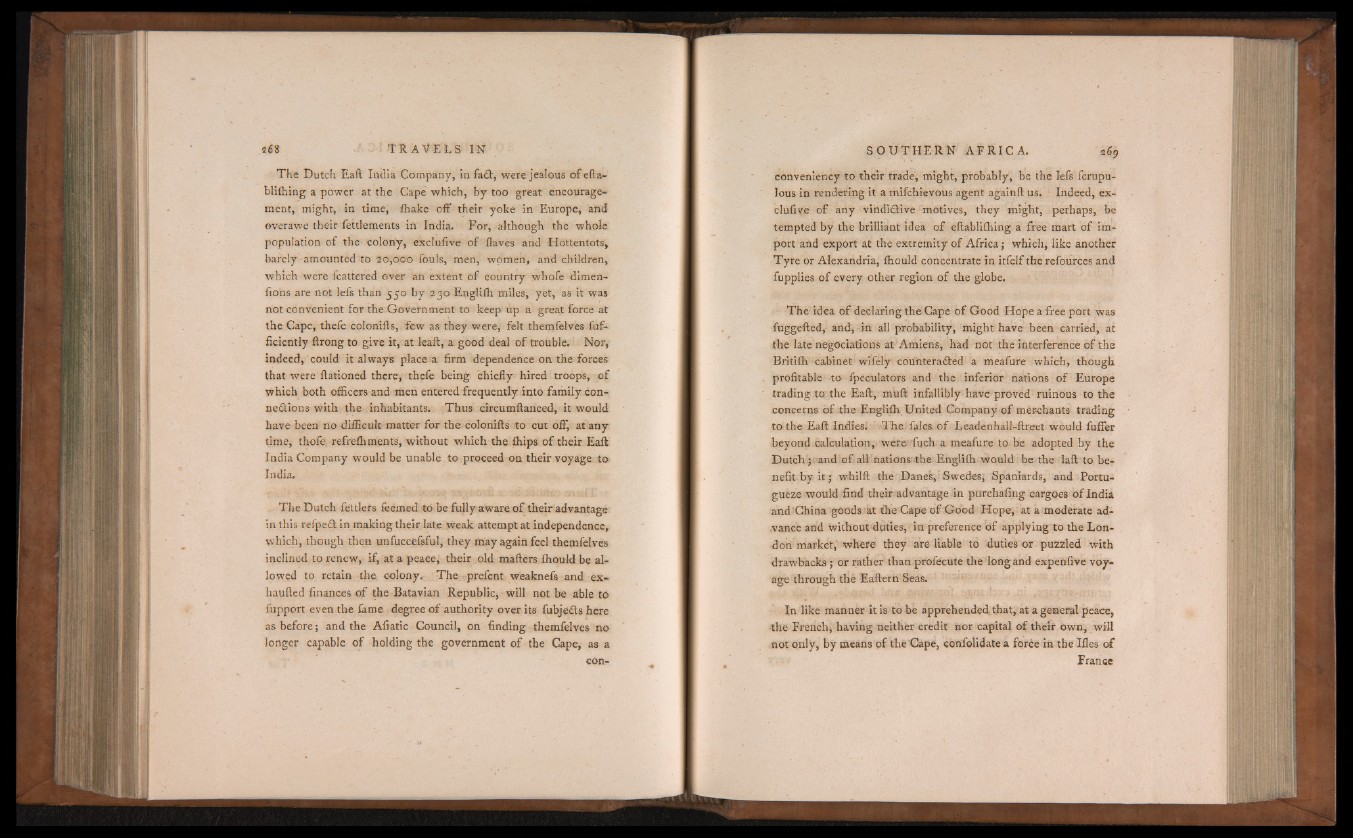
The Dutch Eaft India Company, in fad, were jealous of efta-
bliihing a power at the Cape which, by too great encouragement,
might, in time, ihake off their yoke in Europe, and
overawe their fettlements in India. For, although the whole
population of the colony, exclufive of Haves and Hottentots*
barely amounted to 2o,oco fouls, men, women, and children,
which were fcattered over an extent of country whofe dimen-
fions are not lefs than 550 by 230 Engliih miles, yet, as it was
not convenient for the Government to keep up a great force at
the Cape, thefe colonifts, few as they were, felt themfelves fuf-
ficiently ftrong to give it, at leaft, a good deal of trouble. Nor,
indeed, could it always place a firm dependence on the forces
that were Rationed there, thefe being chiefly hired troops, of
which both officers and men entered frequently into family connections
with the inhabitants. Thus circumftanced, it would
have been no difficult matter for the colonifts to cut off, at any
time, thofe refreffiments, without which the ihips of their Eaft
India Company would be unable to proceed on their voyage to
India.
The Dutch fettlers feemed to be fully aware of their advantage
in this rei'peCt in making their late weak attempt at independence,
which, though then unfuccefsful, they may again feel themfelves
inclined to renew, if, at a peace, their old mafters ihould be allowed
to retain the colony. The prefent weaknefs and ex-
haufted finances of the Batavian Republic, will not be able to
fupport even the fame degree of authority over its fubjeCts here
as before; and the Afiatic Council, on finding themfelves no
longer capable of holding the government of the Cape, as a
conconveniency
to their trade, might, probably, be the lefs fcrupu-
lous in rendering it a mifchievous agent againft us. Indeed, exclufive
of any vindictive motives, they might, perhaps, be
tempted by the brilliant idea of eftablifhing a free mart of import
and export at the extremity of Africa ; which, like another
Tyre or Alexandria, ihould concentrate in itfelf the refources and
fupplies of every other region of the globe.
The idea of declaring the Cape of Good Hope a free port was
fuggefted, and, in all probability, might have been carried, at
the late négociations at Amiens, had not the interference of the
Britiih cabinet wifely counteracted a meafure which, though
profitable fpeculators and the inferior nations of Europe
trading to the Eaft, muft infallibly have proved ruinous to the
concerns of the Engliih United Company of merchants trading
to the Eaft Indies. The. fales of Leadenhall-ftreet would fuffer
beyond calculation, were fijch a meafure to be adopted by the
Dutch ; and of all nations .the Engliih would be the laft to benefit
by it; whilft the Danes, Swedes, Spaniards, and Portu-
gueze would find their advantage in purchafing cargoes of India
and China goods at the Cape of Good Hope, at a moderate advance
and without duties,' in preference of applying to the London
market, where they are liable to duties or puzzled with
drawbacks ; or rather than profecute the long and expenfive voyage
through the Eaftern Seas.
In like manner it is to be apprehended that, at a general peace,
the French, having neither credit nor capital of their own, will
not only, by means of the Cape, cbnfolidate a force in the Ifles of
Franee